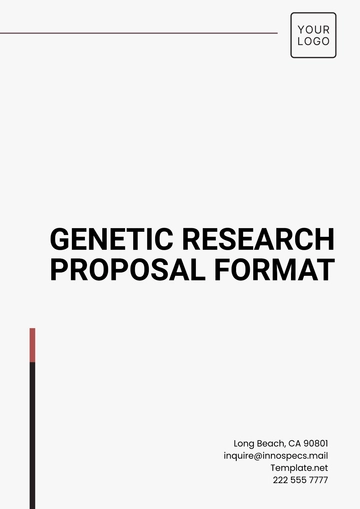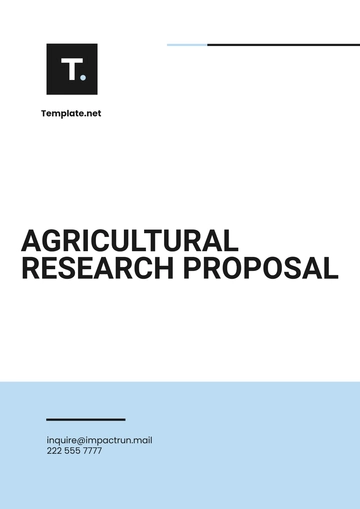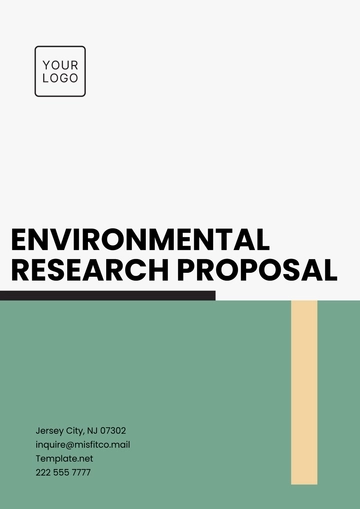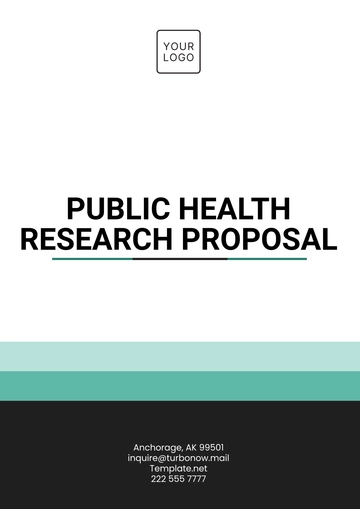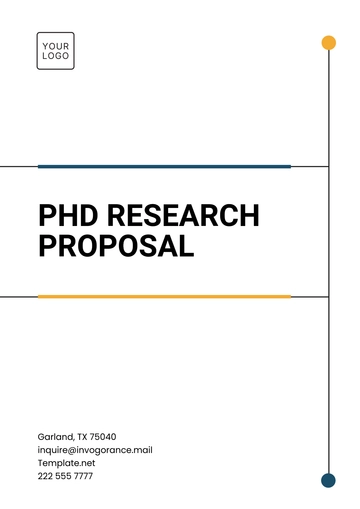Free Printable Chemistry Research Proposal

Title: "Investigating the Effects of Green Chemistry on Sustainable Chemical Processes"
Prepared By: [YOUR NAME]
Date: [DATE]
I. Abstract
This research proposal aims to explore the impact of green chemistry principles on the sustainability of chemical processes. The study will focus on reducing harmful by-products, minimizing energy consumption, and utilizing renewable resources in chemical synthesis. By analyzing case studies and conducting laboratory experiments, this project aims to provide a deeper understanding of green chemistry's potential to address environmental challenges while maintaining industrial efficiency.
II. Introduction
A. Background
Green chemistry is an emerging field that promotes the design of chemical products and processes that minimize the use and generation of hazardous substances. Traditional chemical processes often generate toxic by-products and consume large amounts of energy and raw materials, which contribute to environmental degradation. This research seeks to evaluate how green chemistry principles can be integrated into existing industrial practices to create more sustainable chemical processes.
B. Significance of the Research
The proposed study will contribute to the ongoing efforts to reduce the environmental impact of the chemical industry. Understanding how green chemistry can be applied in real-world scenarios may lead to more efficient and eco-friendly chemical manufacturing processes, which could significantly reduce pollution and energy consumption.
C. Existing Gaps in Knowledge
While many studies have focused on individual green chemistry techniques, there is a lack of comprehensive research assessing the overall impact of integrating multiple green chemistry principles into large-scale industrial processes.
III. Objectives
To analyze the effectiveness of green chemistry in reducing environmental hazards in chemical manufacturing.
To investigate the feasibility of using renewable feedstocks in industrial chemical processes.
To evaluate the energy efficiency of chemical reactions modified by green chemistry principles.
To identify the main challenges and opportunities in applying green chemistry at an industrial scale.
IV. Methodology
A. Research Design
This study will employ both qualitative and quantitative research methods. It will begin with a literature review to establish a theoretical framework, followed by laboratory experiments designed to test specific green chemistry techniques.
B. Materials and Procedures
Reagents and Equipment: The study will use standard chemical reagents and equipment available in the lab, such as reactors, distillation units, and analytical instruments (e.g., gas chromatography).
Experiments: Several chemical reactions will be carried out under controlled conditions, comparing traditional methods with modified green chemistry processes.
Data Analysis: The data collected from the experiments will be analyzed using statistical methods to evaluate the reduction in by-products, energy consumption, and material waste.
V. Timeline
Phase | Duration | Description |
|---|---|---|
Literature Review | 2 months | Review existing research on green chemistry principles. |
Experiment Design & Setup | 1 month | Develop experimental protocols and prepare lab materials. |
Data Collection | 4 months | Conduct experiments and gather data. |
Data Analysis | 2 months | Analyze collected data and evaluate results. |
Final Report Writing | 2 months | Compile findings into a comprehensive research paper. |
VI. Budget
Item | Estimated Cost |
|---|---|
Laboratory Supplies | $3,000 |
Reagents and Chemicals | $2,500 |
Equipment and Materials | $1,500 |
Personnel (Research Assistants) | $4,000 |
Publication and Presentation Fees | $1,000 |
Total | $12,000 |
VII. References
Anastas, P. T., & Warner, J. C. (2050). Green Chemistry: Theory and Practice. Oxford University Press.
Sheldon, R. A. (2052). Green Chemistry and the Ten Commandments of Sustainability. Green Chemistry, 18(12), 3383-3391.
Trost, B. M., & Fleming, I. (2055). Principles of Organic Synthesis. Springer.
- 100% Customizable, free editor
- Access 1 Million+ Templates, photo’s & graphics
- Download or share as a template
- Click and replace photos, graphics, text, backgrounds
- Resize, crop, AI write & more
- Access advanced editor
Create a well-structured proposal for your chemistry research project with our Printable Chemistry Research Proposal Template on Template.net. This editable and customizable template allows you to outline your research ideas, methodology, and expected results clearly. With the convenience of our Ai Editor Tool, you can make edits effortlessly, ensuring a polished document that’s ready for printing and submission.
You may also like
- Business Proposal
- Research Proposal
- Proposal Request
- Project Proposal
- Grant Proposal
- Photography Proposal
- Job Proposal
- Budget Proposal
- Marketing Proposal
- Branding Proposal
- Advertising Proposal
- Sales Proposal
- Startup Proposal
- Event Proposal
- Creative Proposal
- Restaurant Proposal
- Blank Proposal
- One Page Proposal
- Proposal Report
- IT Proposal
- Non Profit Proposal
- Training Proposal
- Construction Proposal
- School Proposal
- Cleaning Proposal
- Contract Proposal
- HR Proposal
- Travel Agency Proposal
- Small Business Proposal
- Investment Proposal
- Bid Proposal
- Retail Business Proposal
- Sponsorship Proposal
- Academic Proposal
- Partnership Proposal
- Work Proposal
- Agency Proposal
- University Proposal
- Accounting Proposal
- Real Estate Proposal
- Hotel Proposal
- Product Proposal
- Advertising Agency Proposal
- Development Proposal
- Loan Proposal
- Website Proposal
- Nursing Home Proposal
- Financial Proposal
- Salon Proposal
- Freelancer Proposal
- Funding Proposal
- Work from Home Proposal
- Company Proposal
- Consulting Proposal
- Educational Proposal
- Construction Bid Proposal
- Interior Design Proposal
- New Product Proposal
- Sports Proposal
- Corporate Proposal
- Food Proposal
- Property Proposal
- Maintenance Proposal
- Purchase Proposal
- Rental Proposal
- Recruitment Proposal
- Social Media Proposal
- Travel Proposal
- Trip Proposal
- Software Proposal
- Conference Proposal
- Graphic Design Proposal
- Law Firm Proposal
- Medical Proposal
- Music Proposal
- Pricing Proposal
- SEO Proposal
- Strategy Proposal
- Technical Proposal
- Coaching Proposal
- Ecommerce Proposal
- Fundraising Proposal
- Landscaping Proposal
- Charity Proposal
- Contractor Proposal
- Exhibition Proposal
- Art Proposal
- Mobile Proposal
- Equipment Proposal
- Student Proposal
- Engineering Proposal
- Business Proposal











